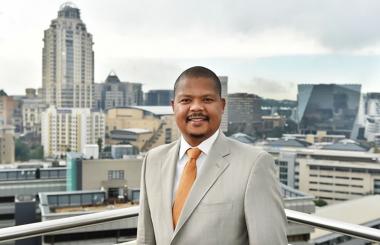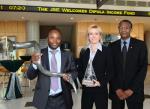Delta Property Fund's new CEO dishes out maiden results
 Siyabonga Mbanjwa, a seasoned construction and property executive, was appointed the new CEO of Delta Property Fund last November.
Siyabonga Mbanjwa, a seasoned construction and property executive, was appointed the new CEO of Delta Property Fund last November.
The new boss of SA’s black-managed and substantially black-owned REIT, Delta Property Fund, today dished out record financial results for the year ended February 2022, emerging as a turn-around story.
Siyabonga Mbanjwa took over the reins as a permanent CEO on the 1st of February 2022. He has more than 24 years of experience in the construction and property sector and has occupied roles at Old Mutual Properties, Crowie Holdings, and SENER Engineering group.
Delta's founding CEO Sandile Nomvete and his colleagues, chief financial officer Shaneel Maharaj and chief operating officer Otis Tshabalala, left the company in August 2020, after accusations of wrongdoing and other unethical business dealings. However, the executives maintained that they did nothing wrong.
“This is my maiden set of financial results, having joined Delta in February this year, and I am delighted to report that the turn-around strategy implemented by the board is increasingly gaining traction despite serious macro-economic and sectoral headwinds,” said Mbanjwa.
“We have enhanced our internal controls and bolstered our staff complement and competencies, allowing us to focus on the renewal of long outstanding leases and continued execution on our capital expenditure commitments to ensure that our assets meet our tenants’ requirements.
“We further improved our collection rate from 87.03% in 2021 to 112.7% which contributed to a 17.8% increase in SA REIT funds from operations – or distributable earnings – of 36.91 cents per share,” Mbanjwa remarked.
During the reporting period, capital expenditure on investment property totalled R112.8 million.
The Group concluded new leases with a combined gross lettable area (GLA) of 17 586m2, with a further 70 548 m2 renewed.
“Our focus on rebuilding trust with our largest tenant, the Department of Public Works and Infrastructure (DPWI), and our capex programme yielded positive results. We negotiated expired month-to-month leases with a GLA of 126 233m2 which concluded shortly after year-end,” added Mbanjwa.
Rental income (including recoveries) as well as net property income decreased by 4.0% and 8.1% respectively mainly because of negative rental reversions on the lease renewal at Phomoko Towers and the Hensa building where nine-year, eleven-month and five-year leases were secured respectively.
Property operating expenses increased slightly to R571.3 million from R556.7 million. Administrative expenses decreased from R116.4 million to R97.8 million.
Vacancies increased during the period from 27.2% to 31.3% (including buildings to be renovated before letting). However, asset disposals and other letting activities are expected to reduce vacancies significantly in the near term, with 26 properties with a market value of R787 million earmarked for disposal.
Delta’s property portfolio consisted of 99 properties with a total investment value of R7.9 billion and a gross lettable area of 909 530m2. The portfolio value (including non-current assets held for sale) reduced by 4.1% from R8.2 billion to R7.9 billion due to slow economic growth evidenced by the capitalisation rates, exit rates and increased vacancies.
As a result, the Group’s loan-to-value (“LTV”) increased slightly from 56.5% in the prior year to 57.0%. The interest cover ratio, which is a measure of Delta’s ability to service debt, however remained stable at 1.9 times due to the low interest rate environment following the reduction in the repo rate during the reporting period and the ongoing amortisation of debt by the Group. Based on its disposal programme and leasing initiatives, Delta is targeting an LTV of 40% for its 2024 financial year.
Net finance costs decreased by 6.1% from R413.6 million to R388.3 million. Interest bearing borrowings decreased by R210.5 million attributable to amortisations and the disposal of Domus in May 2021. The weighted average all-in cost of funding continued to reduce to 7.4% (FY21: 8.2%)
“Going forward, we will continue to intensify our efforts on business development and leasing. We are aiming to reduce our vacancy rate to be on-par or below the SAPOA average by 2025.
“We will also optimise our portfolio by focusing on disposal of non-core assets, converting some of the assets that we own into other uses.
“One of our strategic objectives is to diversify the portfolio by 2025 into other asset classes. Important though is that 50% of the portfolio will be anchored by sovereign tenants,” Mbanjwa concluded.
The Company did not declare a dividend during the period and is planning to resume dividend payment based on the success of its turn-around strategy.

















